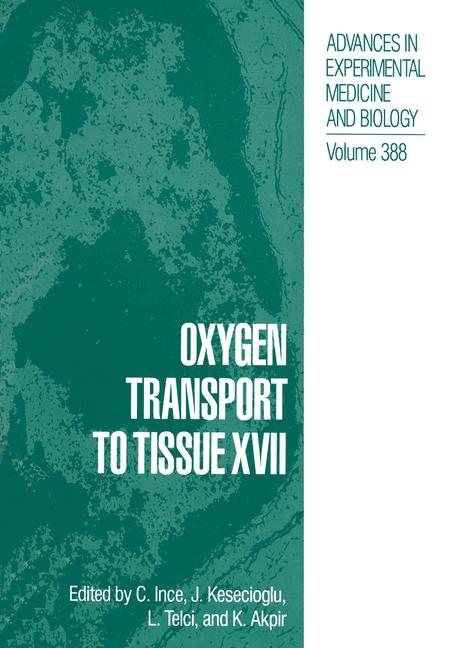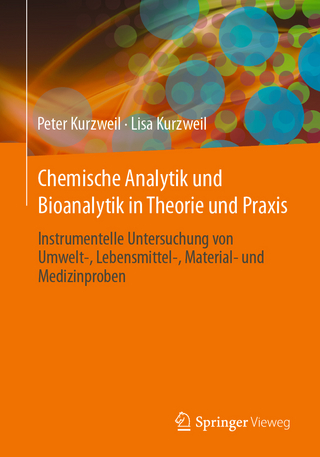
Oxygen Transport to Tissue XVII
Kluwer Academic/Plenum Publishers (Verlag)
978-0-306-45200-0 (ISBN)
- Titel ist leider vergriffen;
keine Neuauflage - Artikel merken
1. From Germany to Britton.- Methods for Assessment of Oxygenation.- 2. Oxygen Electrodes and Optodes and Their Application in vivo.- 3. Retino-Choroidal Oxygen Imaging through a Fundus Camera.- 4. Cerebral Oxygenation during Cardiopulmonary Bypass.- 5. Lightguide Spectrophotometry for the Assessment of Skin Healing Viability in Critical Limb Ischaemia.- 6. In vivo Measurement of Oxygen Pressure Using 19F-NMR Imaging.- 7. O2 Flux Optode.- 8. Reflectance Pulse Oximetry.- 9. A Novel Method to Demonstrate Capillary Geometry and Perfusion Patterns in Rat Brain from the Same Histological Section.- 10. Comparison between Conventional Hemodynamic Monitoring and Polarographic Tissue pO2-Monitoring of the Liver in Early Septicemia of the Pig.- 11. Estimation of Cerebral Blood Volume and Transit Time in Neonates from Quick Oxygen Increases Measured by Near-Infrared Spectrophotometry.- 12. Oxygen Dependent Quenching of Phosphorescence.- 13. Empirical Modeling for Oxygen Transport Processes and Related Physiological and Bioprocess Systems.- 14. How Tissue Optics Influences Reflectance Pulse Oximetry.- 15. Effect of Optode Separation on Brain Penetration in Adults.- The Physiology of Oxygen Transport.- 16. Theoretical Basis versus Clinical Practice of Oxygen Parameters of Blood.- 17. Physiological Basis of Definitions Relating to Oxygen Transport in Blood.- 18. Measurement of the Oxygenation Status of the Isolated Perfused Rat Heart Using Near Infrared Detection.- 19. Plasma Mixing Is Likely to Affect Capillary Oxygen Transport in Hard Working Rat Heart.- 20. Practical Applications of Models of Oxygen Supply, Diffusion, and Consumption.- 21. The Effect of Capillary Blood Flow on the Oxygen Release into Rat Heart Tissue.- 22. Myocardial Oxygenation and Contractile Function during Graded Reduction of Coronary Flow.- 23. Basal Q10 for Cerebral Metabolic Rate for Oxygen (CMRO2) in Rats.- 24. Comparison of in vivo Microvascular Perfusion Pattern between Skeletal Muscle and Heart.- 25. Control of Oxidative Metabolism in Volume-Overloaded Rat Hearts.- 26. Cytochrome Oxidase Is the Primary Oxygen Sensor in the Cat Carotid Body.- 27. Cerebral Oxygenation Changes during Motor and Somatosensory Stimulation in Humans, As Measured by Near-Infrared Spectroscopy.- 28. Preservation of Mitochondrial Membrane Potential during Anoxia.- 29. Influence of the Treadmill Speed/Slope on Quadriceps Oxygenation during Dynamic Exercise.- 30. Discrepancy between Evidence and Theory of Myoglobin SO2 in Work.- 31. Is There a Reduction of Ischaemia/Reperfusion Damage in the Isolated Rat Heart by Alternating Oxygenated and Deoxygenated Reperfusion Solutions?.- 32. Model Analysis of Oxygen Isotope Fractionation in Humans Due to Disturbances of Pulmonary Gas Exchange.- 33. Simulation of Gas Exchange and Pulmonary Blood Flow Using a Water-Displacement Model Lung.- 34. What Determines Cardiac Oxygen Consumption and How Is It Regulated?.- 35. Mitochondrial NADH in the Langendorff Rat Heart Decreases in Response to Increases in Work.- 36. Hypoxia/Ischemia and the pH Paradox.- 37. Non Invasive Measurement of Brachioradial Muscle VO2-Blood Flow Relationship during Graded Isometric Exercise.- 38. Extra- and Intracellular Oxygen Supply during Cortical Spreading Depression in the Rat.- 39. The Energy Dependent Redox Responses of Heme and Copper in Cytochrome Oxidase in Rat Brain in situ.- 40. Critical Oxygen Extraction in Piglet Hindlimb is Impaired after Inhibition of ATP-Sensitive Potassium Channels.- 41. Responses of Electrical Activity and Redox State of Cytochrome Oxidase to Oxygen Insufficiency in Perfused Rat Brain in situ.- 42. Diffusion Coefficient of Oxygen in Various Model Layers as Determined by Analysis of Time-Dependent Diffusion.- 43. Realistic Modelling of Capillary Spacing in Dog Gracilis Muscle Greatly Influences the Heterogeneity of Calculated Tissue Oxygen Pressures.- Organ System in Disease.- 44. Oxygen Transport in Tumors.- 45. Fluctuations in the Oxygenation of Experimental Tumours.- 46. The Effects of Chronic Hyperoxia (80%) on the Behavior of Rat Litters.- 47. The Changes of Skin and Mesenteric Miro vascular Permeability in Adaptation to Hypoxia in Rats.- 48. Detection of Microregional Fluctuations in Erythrocyte Flow Using Laser Doppler Microprobes.- 49. Fractionation Effects of Oxygen Isotopes within Interstitial Lung Disease.- 50. Changes in Blood Flow in the Common Femoral Artery Related to Inactivity and Muscle Atrophy in Individuals with Long-Standing Paraplegia.- 51. Tumour Oxygenation.- 52. Rise of Tissue Temperature Induced by Reduced Blood Perfusion Caused by External Pressure.- 53. System Parameter Analysis of NIR-TRS Spectra from Homogeneous Media with and without an Absorbing Boundary and from Heterogeneous Media with a Single Absorber.- 54. Response of Cortical Oxygen Pressure and Striatal Extracellular Dopamine in the Brain of Newborn and Adult Animals to Hypoxia.- 55. The Role of PAF and the Effect of a Specific PAF Antagonist on Local Tissue PO2 and Neuronal Integrity during and after Photothrombotic Brain Infarction in Unanesthetised Rabbits.- 56. Monitoring of Mitochondrial NADH Levels by Surface Fluorimetry as an Indication of Ischaemia during Hepatic and Renal Transplantation.- 57. Studies on Tumor Oxygenation in a Rat Rhabdomyo—Sarcoma during Fractionated Irradiation.- 58. Ischemic Heart: Microcirculatory Aspects.- 59. The Lung in Distress.- 60. Significance of Endothelium-Derived Relaxing Factor (EDRF) on Pulmonary Vasoconstriction Induced by Hypoxia and Hypercapnia.- 61. The Role of Reactive Oxygen Species in Ischemia-Reperfusion Injury of Rat Lung.- 62. Potentiation of the Age-Dependent Ca Uptake into Coronary Arteries of Rats by the Risk Factor Genetic Hypertension.- 63. Oxygen Tension in Isotransplanted Mammary Carcinomas and Osteosarcomas before and after Irradiation.- 64. Oxygen Supply during Cardiopulmonary Bypass (CPB) in Cyanotic Patients.- 65. The Efficacy of Pulse Oximetry in the Postoperative Respiratory Management of Cardiac Patients.- Restoration of Oxygen in Disease.- 66. Extracorporeal Oxygenation.- 67. Comparison of Gastric Intramucosal pH Measurements with Oxygen Supply, Oxygen Consumption and Arterial Lactate in Patients with Severe Sepsis.- 68. Mechanical Ventilation in ARDS.- 69. Assessment of Ventilation Inhomogeneity and Gas Exchange with Volume Controlled Ventilation and Pressure Regulated Volume Controlled Ventilation on Pigs with Surfactant Depleted Lungs.- 70. Operative Lung Continuous Positive Airway Pressure via the Lumen of a Movable Bronchial Blocker.- 71. Sepsis and Nitric Oxide.- 72. Assessment of Pressure-Volume Curve of the Respiratory System in Mechanically Ventilated Patients with ARDS.- 73. Titrating PEEP Therapy in Patients with Acute Respiratory Failure.- 74. Effects of Different CPAP Systems on Weaning Parameters in Patients Recovering from Acute Respiratory Failure.- 75. Negative Slope of Exhaled CO2 Profile.- 76. Nebulization of Endotoxin during Mechanical Ventilation.- 77. Supporting Tissue Oxygenation during Acute Surgical Bleeding Using a Perfluorochemical-Based Oxygen Carrier.- 78. The Role of Amino Groups in Hemoglobin Oxygen Binding.- 79. Effects of Oxygenator and Pumping Devices on Blood Parameters in Open Heart Surgery.- 80. CBV during Exchange Transfusion in Infants with Erythroblastosis.- 81. Effects of Volume Controlled Ventilation with PEEP, Pressure Regulated Volume Controlled Ventilation and Low Frequency Positive Pressure Ventilation with Extracorporeal Carbon Dioxide Removal on Total Static Lung Compliance and Oxygenation in Pigs with ARDS.- 82. Effects of Different Modes of Ventilation on Right Ventricular Function in Patients with ARDS.- 83. Pulmonary Mechanics during Laparoscopic Surgery.- 84. Short Term Effects of SIMV and PSV on Work of Breathing by Pulmonary Monitor CP-100 (Bicore).- Indices.- Author Index.
| Erscheint lt. Verlag | 31.8.1996 |
|---|---|
| Zusatzinfo | 654 p. |
| Verlagsort | New York |
| Sprache | englisch |
| Gewicht | 1380 g |
| Themenwelt | Naturwissenschaften ► Biologie ► Biochemie |
| Naturwissenschaften ► Biologie ► Zoologie | |
| ISBN-10 | 0-306-45200-6 / 0306452006 |
| ISBN-13 | 978-0-306-45200-0 / 9780306452000 |
| Zustand | Neuware |
| Haben Sie eine Frage zum Produkt? |
aus dem Bereich


